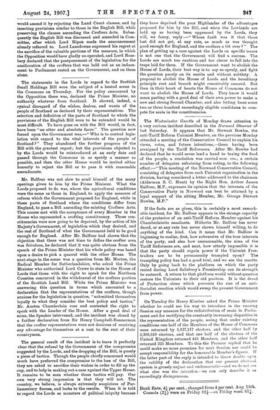The general result of the incident is to leave it
perfectly clear that the refusal by the Government of the compromise suggested by the Lords, and the dropping of the Bill, is purely a piece of tactics. Though the people chiefly concerned would much have preferred the compromise to the loss of the Bill, they are asked to sacrifice their wishes in order to fill up the cup, and to help in making out a case against the Upper House. It remains to be seen whether these tactics will pay. Onr own very strong impression is that they will not. The country, we believe, is always extremely suspicious of Par- liamentary finesse, and looks to the results. When it is told to regard the Lords as monsters of political iniquity because they have deprived the poor Highlander of the advantages proposed for him by the Bill, and when the Lowlands are held up as having been oppressed by the Lords, they will, we fancy, reply :—" Whose fault was it that these last did not get, at any rate, as much as was thought good enough for England, and the crofters a bit over P " The plan of getting up a case against the Lords on specific issues is not one that the Government will find a success. The Lords are much too cautious and too clever to fall into the traps laid for them. If the Government want to abolish the House of Lords, their best way is to say so openly, and fight the question purely on its merits and without subtlety. A proposal to abolish the House of Lords and the hereditary principle root and branch might conceivably succeed. But then in their heart of hearts the House of Commons do not want to abolish the House of Lords. They know it would mean parting with a good deal of their own power to make a new and strong Second Chamber, and also letting loose some two or three hundred exceedingly eligible candidates to com- pete for seats in the constituencies.


































 Previous page
Previous page